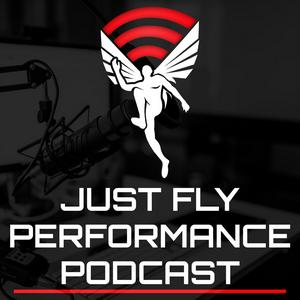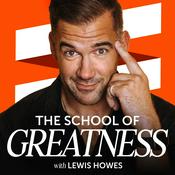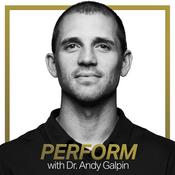338 episodes
- Today’s guest is Zac Cupples, PT, DPT, OCS, CSCS, a physical therapist and strength coach known for bridging rehabilitation and performance. He’s the founder of ZacCupples.com and is respected for translating complex concepts around respiration and movement mechanics into practical tools coaches and clinicians can immediately apply to improve efficiency, reduce pain, and enhance performance.
The bridge between sports performance rehab is an important one. In the midst of movement mechanics that drive good rehab, and high intensity lifting, lies the knowledge that can help athletes make continual gains while staying robust and healthy for their sport.
On today’s show, Zac explores how an athlete’s structure influences movement, strength training, and even injury risk. He shares his track background and how it shaped his coaching, then unpacks concepts like narrow vs. wide “ISA” builds, why some athletes struggle to feel their hamstrings in traditional lifts, and how tools like front loading, box squats, machines, and sprinting can solve it. He also digs into long-duration isometrics, mobility vs. flexibility, and finishes with a fun lightning round.
Today’s episode is brought to you by Hammer Strength.
Use the code “justfly20” for 20% off any Lila Exogen wearable resistance training, including the popular Exogen Calf Sleeves. For this offer, head to Lilateam.com
Use code “justfly10” for 10% off the Vert Trainer
View more podcast episodes at the podcast homepage. (https://www.just-fly-sports.com/podcast-home/)
Timestamps
1:23 – Early Athletic Experiences
5:36 – Muscle Activation Challenges
11:22 – Structural Constraints and Movement
25:17 – Rethinking Traditional Strength Training
29:17 – The Role of Machines in Training
36:54 – Weight Shifts and Mechanics
40:45 – Long Hold Activities in Rehab
53:21 – Internal vs. External Rotation
59:27 – Flexibility vs. Mobility
1:07:06 – Lightning Round Questions
1:14:04 – Future Plans and Coaching Focus
Zac Cupples Quotes
"You got to preserve moving fast because that's how you catch yourself from falling."
"It assumes everyone has the same body but no two people are going to perform both of those movements the same way, and it's not going to load the same way."
"I start the majority of people with a box squat, because the way I think about a hinge is it's different from a squat because the hips are going to be moving more along that horizontal path."
"It's way more useful to think, am I moving up and down? Am I moving side to side? And then just pick exercises within what a person has available."
"If someone can't produce certain rotations, and I know that you need those rotations to do this movement, you probably got to find something else to train that pattern within their constraints."
"You just have to find the hinge variation that they can execute. And if they don't have much to do that, you have to create constraints."
About Zac Cupples
Zac Cupples, PT, DPT, OCS, CSCS is a physical therapist, strength coach, and educator specializing in human movement, respiration, and performance optimization. He is the founder of ZacCupples.com and has become widely known for translating complex biomechanical and neurophysiological concepts into practical strategies that clinicians and coaches can immediately apply.
Zac earned his Doctorate in Physical Therapy from Marquette University and is board certified as an Orthopedic Clinical Specialist. He has completed extensive post-graduate education through the Postural Restoration Institute (PRI) and integrates principles of respiration, pelvic mechanics, thoracic positioning, and neuromuscular control into both rehabilitation and performance training.
Through his online courses, seminars, and educational content, Zac has influenced thousands of clinicians and coaches worldwide. His work bridges the gap between rehab and high performance, helping athletes move more efficiently, reduce pain, and unlock higher levels of strength and speed through better positional awareness and strategic breathing.
Zac currently treats clients and consults internationally, while continuing to produce educational resources aimed at elevating the standard of movement practice in both clinical and performance settings. - Today’s guest is Tanner Care. Tanner Care is a high-performance specialist, currently serving as the Director of Player Performance for the BC Lions (CFL) and the Director of Athletic Performance for the Vancouver Bandits (CEBL). Since 2023, he has also held the role of Head Strength and Conditioning Coach at Simon Fraser University, where he oversees the physical development of athletes across 13 collegiate sports.
On the surface, strength and conditioning is about increasing an athlete’s physical strength and capacities. To dig deeper and help athletes reach their highest potential, an understanding of sprint-specific forces, athlete archetypes, and dosage of inputs is essential.
On today’s show, Tanner talks about his practical framework for elite athlete development. He shares how he integrates max-speed work into sport-specific drills, such as full-court basketball overthrows, and explains his “layered” coaching model, which progresses from foundational health and general capacity to more specific archetyping. The conversation also dives into the technical side of his toolkit, including the use of run-specific isometrics for sprint transfer, plyometric training, and how he balances force-velocity profiles across different athlete types. Ultimately, Tanner advocates for a “health-first” approach in the pro setting, favoring consistent, high-quality inputs over unnecessarily complex training schemes.
Today’s episode is brought to you by Hammer Strength and Lila Exogen.
Use the code “justfly20” for 20% off any Lila Exogen wearable resistance training, including the popular Exogen Calf Sleeves. For this offer, head to Lilateam.com
Use code “justfly10” for 10% off the Vert Trainer
View more podcast episodes at the podcast homepage. (https://www.just-fly-sports.com/podcast-home/)
Timestamps
0:03 – Introduction to Athlete Classification
2:19 – Innovative Training Drills
6:26 – Understanding Movement Signatures
11:32 – Exploring Strength Qualities
19:53 – Classifying Athlete Strength
32:02 – Benefits of Single Leg Strength
45:17 – Adjusting Training Based on Athlete Type
49:30 – Implementing Quasi-Isometrics
56:25 – The Complexity of Training Modalities
1:04:17 – Foot Positioning and Athletic Outcomes
1:07:47 – Closing Thoughts and Future Plans
Tanner Care Quotes
On Speed in Practice: "So the problem I was trying to solve was how can we check these speed residual boxes within the constraints of practice."
On the Priority of Training: "That's layer one health has to come before performance. So removing any potential inhibition."
On Dynamic vs. Passive Screening: "I've seen so many people get on a table, assess passive hip internal rotation and say there's some kind of limitation. But when we see it dynamically at sports speed, it's like, oh, there it is."
On General Movement Competency: "I can't tell you the amount of professional guys I have come in that like can't do like rudimentary plyometrics like they can't hop or bound stationary let alone locomotively"
On Local vs. Global Issues: "Do we have a Ferrari? Do we have a Honda Civic? Do we have a Ferrari with a flat tire? Like, sometimes we just have to deal with local issues, not necessarily broad systems of improving the overall organism."
On the Limits of Strength: "We know that the strongest individuals aren't necessarily the most forceful individuals. At some point, there's a clear cutoff."
On Stiffness and Propulsion: "Rate of force development and stiffness isn't always a good thing if they don't have the propulsive qualities necessary to actually displace their hips horizontally"
On Force and Sprint Performance“If you’re able to generate adequate force at adequate time and attenuate high braking force, that’s always going to correlate positively with sprint performance.”
On Weight Room Philosophy: "I try to remove skill or as much skill as I can within the context of the weight room."
About Tanner Care
Tanner Care is a credentialed strength and conditioning professional specializing in elite athlete development across pro and collegiate levels. He currently serves as Director of Performance for the Vancouver Bandits (CEBL) and the BC Lions (CFL), overseeing strength & conditioning, load management, sport science, and performance nutrition to enhance athlete readiness and longevity.
Previously, he was Head Coach of Strength & Conditioning at Simon Fraser University (NCAA), leading programs across multiple sports including men's basketball and track & field, where he built evidence-based training systems. Tanner holds RSCC and CSCS certifications (NSCA), is an EXOS Performance Specialist, and earned his Master's (MS(c)) from the University of Florida.
His background includes roles like Head S&C Coach for University of Ottawa rugby. He contributes to the field as a SimpliFaster author, podcast guest on performance systems, and CSCA advisory team member. Passionate about sprint training, speed, and mechanics, he's a dedicated husband, family man, and 49ers fan. - Today’s guest is Paul Cater. Paul is a veteran strength and conditioning coach with over 25 years of experience spanning professional baseball, collegiate athletics, and high-performance team environments. Paul is known for blending traditional strength training with rhythm, timing, gravity, and a deeply relational, art-driven approach to coaching. His work challenges purely formulaic or data-driven models and puts the live training session back at the center of athlete development.
In an era where training is increasingly automated, optimized, and reduced to dashboards and numbers, it’s easy to lose the human element that actually drives performance. This conversation explores how rhythm, feel, load, and coaching presence shape not just outputs, but adaptability, resilience, and long-term athletic growth. If you’ve ever felt that “something is missing” in modern training environments, this episode speaks directly to that gap.
In this episode, Paul and I explore training as a live performance rather than a static program. We discuss using early isometric and axial loading as a readiness anchor, how downbeat rhythm and eccentric timing drive better outputs, and why chasing numbers too aggressively can undermine real performance. We dive into music, movement, art, and coaching intuition, and how creating alive, rhythmic sessions builds stronger athletes, and better coaches, without relying solely on rigid protocols or excessive monitoring.
Today’s episode is brought to you by Hammer Strength and Lila Exogen.
Use the code “justfly20” for 20% off any Lila Exogen wearable resistance training, including the popular Exogen Calf Sleeves. For this offer, head to Lilateam.com
Use code “justfly10” for 10% off the Vert Trainer
View more podcast episodes at the podcast homepage. (https://www.just-fly-sports.com/podcast-home/)
Timestamps
0:00 – Mountain Training Inspirations
6:00 – The Role of Community in Training
12:15 – Performance and the Observer Effect
23:27 – Shifting Training Protocols
32:32 – Balancing Data and Intuition
42:14 – Efficacy of Isometric Training
47:23 – Five-Minute Wonders
53:28 – The Art of Adaptation
57:44 – Embracing the Subconscious
1:28:06 – A Playlist for Performance
Quotes from Paul Cater
"We're really just trying to create meaning with our training, to justify it to other people, or wives, or coaches, or whatever, but also to really harness what the weight's doing or the external stimulus is doing for us"
"I do approach it like it's a performance. A coaching session. And if you pawn so much off to the to the robotics or the formula, it becomes almost like it's a prison."
"20 minutes of rolling around on the ground and trying to do the stretching warm-ups- I've just almost eliminated those. Full stop. I can't remember the last time I did an active dynamic or same static stretching things like that."
"Can you match time, and beat? ...And that's really everything, because what else is there in the transfer of training if it's not related to that timing tempo and rhythm"
"I use the tech throughout the session quite heavily actually, but I don't use it as the primary validator or guider."
"The world's greatest warm-up for me is always, we've called it bartending. Where the progression is how much can you hold on your back for five minutes... I just do whatever. Walk around. Rules, you just can't touch the bar to the ground."
"Get to that at that perfect point where you feel the adaptation happen then you walk away, and you don't need to do anymore. Like what's the minimal dose you need to do?"
About Paul Cater
Paul Cater is a veteran strength and conditioning coach with over 25 years of experience working across professional baseball, collegiate athletics, tactical populations, and high-performance team sport environments. He has served in leadership and performance roles with organizations including Major League Baseball, NCAA programs, and private high-performance facilities, and is known for his ability to blend high-intensity strength training with rhythm, coordination, and ecological skill development.
Paul’s coaching philosophy emphasizes gravity, timing, and rhythm as foundational drivers of athletic performance. Rather than relying solely on rigid programming or isolated testing, his sessions are built around early exposure to meaningful load, isometric and inertial work, and rhythmic constraints that reveal readiness, alignment, and intent in real time. His work integrates elements of sprint mechanics, change of direction, elastic strength, and movement artistry to create training environments that are both physically effective and psychologically engaging.
Currently working in a collegiate performance setting, Paul is deeply interested in coaching as a live, relational craft; treating each session as a performance that develops not just outputs, but awareness, adaptability, and ownership in athletes. His approach bridges traditional strength training with concepts from sport, art, music, and survival movement, offering a perspective that challenges purely automated or data-driven models of performance. - Today’s guest is Martin Bingisser. Martin is the founder of HMMR Media, one of the most trusted independent voices in throws and track & field education. A former competitive hammer thrower, Martin blends firsthand experience with deep historical and technical insight to analyze training methods, athlete development, and coaching culture. Through articles, videos, and interviews, his work bridges elite practice and practical coaching, earning him respect from coaches and performance professionals around the world.
In a world of rapid-information delivery and short attention spans, the wisdom of master coaches is becoming increasingly rare. Martin has spent substantial time with two legends in the coaching world, Anatoliy Bondarchuk and Vern Gambetta. Spending time discussing the work of the past, and wisdom through the present is a critical practice in forming an effective coaching viewpoint.
On today’s episode I chat with Martin in a wide-ranging conversation in coaching lessons on efficiency, adaptability, and performing under pressure (two throws, no warmups, huge crowds). We transition into Bondarchuk’s training philosophy: exercise classification, consistency, “strength” as sport-specific force production, and why weight-room PRs can distract from performance. The episode closes with motor-learning insights on rhythm, holistic cues, and how Vern Gambetta’s “general” work complements specificity.
Today’s episode is brought to you by Hammer Strength and the Just Fly Sports Online Courses
30-50% off all courses until December 1, 2025. (https://justflysports.thinkific.com)
Use code “justfly10” for 10% off the Vert Trainer
Use code “justfly20” for 20% off of LILA Exogen Wearable resistance gear at www.lilateam.com
View more podcast episodes at the podcast homepage. (https://www.just-fly-sports.com/podcast-home/)
Timestamps
0:00 – Martin’s background and training lens
7:05 – Why eccentric strength matters
15:40 – Isometric intent and force expression
24:30 – Tendons, stiffness, and elastic qualities
33:50 – Managing fatigue in strength training
42:15 – Applying eccentric and isometric work
51:20 – Athlete readiness and daily adjustment
1:00:10 – Long term development and durability
Quotes from Martin Bingisser
"You think, okay, big heavy rock, like it's all about strength. And instead it's about efficiency."
"Even the most simple sport that looks like it's all about strength, it's not really just about strength."
"It's measurable strength versus this kind of adaptable strength that can fit into different situations."
"Is strength how much I can move on a barbell, or is strength how much force I can create in the ring?"
"No one is saying you don't have to be strong. Everyone agrees you have to be strong. It's just how do we define strength? and how do we define that? Because all these guys are strong. They're just strong in different ways."
"We're doing all the categories the whole year and you need to have that general stuff in there too. So you look at our program throughout the year, we put a lot of work into those general categories, but they're not the highest priority. And we're not doing stuff in the specific preparatory or the general preparatory stuff that's going to hinder our first priority stuff."
"Probably 80% of the benefit of Bondarchuk's program comes down to two or three key things. And you can apply those to any type of program. It doesn't have to be Bondarchuk's methods, but one of the big ones is just consistency."
"If I see something I like, I try not to say very much except do that again. Like, I don't care what you had to think about to do that, but just do that again. Like that's just reinforcing, those good habits."
"Am I just trying to copy a good thrower or am I trying to find a solution that'll fit my athlete? ... But if you don't understand what they're trying to get out of it, you're just trying to copy what you see the video of, it's useless."
About Martin Bingisser
Martin Bingisser is the founder of HMMR Media, one of the most respected independent platforms covering throws, strength training, and track & field performance. A former competitive hammer thrower, Martin combines firsthand athletic experience with a sharp analytical eye to break down training theory, competition trends, and athlete development across all levels of the sport.
Through HMMR Media, he produces in-depth articles, interviews, videos, and educational resources that bridge the gap between elite coaching practice and accessible learning. His work is known for its clarity, historical context, and willingness to challenge oversimplified narratives in modern training.
Martin has collaborated with coaches, athletes, and federations worldwide, and his content is widely used by throws coaches, sport scientists, and performance professionals seeking thoughtful, evidence-informed perspectives. His approach emphasizes long-term athlete development, technical mastery, and the craft of coaching; making him a trusted voice in the global track and field community. - Today’s guest is Aaron Uthoff. Aaron Uthoff, PhD, is a sport scientist and coach whose work sits right at the intersection of biomechanics, motor learning, and sprint performance. His research digs into acceleration, force application, and some less conventional forms of locomotion, including backward sprinting, with the goal of connecting solid science to what actually works on the field, track, or in rehab.
Backward running shows up all the time in warm-ups and general prep. Most of the time, though, it’s thrown in casually, without much thought about what it might actually be doing for speed, coordination, or tissue loading.
In this episode, Aaron walks through his path into performance science, which is anything but linear. From skiing in Montana and playing desert sports, to football and track, to a stretch training horses in Australia, his journey eventually led him to research mentors in Arizona, Scotland, and New Zealand. That broad background shows up clearly in how he thinks about movement.
One of the big takeaways from our conversation is Aaron’s overview of research showing that structured backward running programs can improve forward acceleration and even jumping ability. We also get into how backward running can be used as a screening and coordination tool, and where it fits into rehabilitation, including what’s happening at the joints, how muscles are working, and how to progress it without forcing things.
We finish by digging into wearable resistance, including asymmetrical loading, and why this emerging tool may have more upside for speed and movement development than most people realize.
Today’s episode is brought to you by Hammer Strength and Lila Exogen.
Use the code “justfly20” for 20% off any Lila Exogen wearable resistance training, including the popular Exogen Calf Sleeves. For this offer, head to Lilateam.com
Use code “justfly10” for 10% off the Vert Trainer
View more podcast episodes at the podcast homepage. (https://www.just-fly-sports.com/podcast-home/)
Topics
0:00 – Aaron’s background and coaching lens
6:40 – Seeing movement through posture and orientation
13:25 – Why breathing changes how athletes move
20:45 – Tempo, rhythm, and shaping better movement
30:10 – Constraints based coaching and problem-solving
40:55 – Sprint mechanics without over cueing
51:20 – Using environment to guide adaptation
1:01:30 – Blending strength work with movement quality
1:12:15 – Coaching intuition, feedback, and learning to see
Quotes from Aaron Uthoff
"Backwards running is about 70 % of the speed of forward. 60 to 70 % of the speed of forwards running. So whatever your maximum speed forward is about 70 % of that backwards for somebody who's been doing it for a little while. So just there tells you that there's not going to be the same magnitude of force as there is with a forward sprint."
"If you've got anterior knee pain, which happens with lot of plyometrics, jumping, you think a lot of court-based sports, jumping track-based sports, things like that, you can simply reduce their patellofemoral joint loading by having them go backwards."
"What we see that I love preferentially is that we actually get really high hamstring activation concentrically, which is not the case with forwards running."
"I've got an injured athlete who had a hamstring injury and just wasn't able to decelerate his shank when he was sprinting forwards. So I had him run backwards. And what that's done is that's trained his hamstring concentrically to basically contract really, really quickly without putting that undue eccentric stress onto the joint on the muscles."
"I think it's a good screening tool to see, well, where are they at from a coordination proprioceptive perspective? And you might have somebody that's super duper fast going forwards, but you know, if they actually can apply that skill, then you know, their proprioception is likely off a little bit."
"By removing that vision... you're just having to tap into a different system a little bit more. And I find that that's one of the things that allows athletes to really expand their skillset majorly.
"Backside mechanics plays a large role in the elasticity that's going to happen and the power that you're to be able to deliver on the front side of the body. And if you shorten that up or you're inefficient or uncomfortable in that space, then you know, backwards running is a really cool way to learn how to do that in a way that is a little bit safer at a slightly lower speed where it's a new drill."
"I want you to be racing your belly, basically your belly button and your chest are going to be racing to the finish line. But unlike forward running, I want your belly button just to slightly win. And that just puts them into a posture that allows them to have that, that slightly lean, but still be upright."
"Another thing I really like is I want them to stack their hips, basically their ribcages on top of their hips. They've got nice intra-abdominal pressure to allow that elastic recoil to happen through the core."
"I think there's a lot more spinal engine utilized intensively with a backwards run than we might realize. And that's one of the major things I'm seeing. So we integrate a lot of spinal engine work into our drills just to help with the ability to carry that in.
"If you actively, concentrically contract the hamstring and try to kick that heel out back behind you, and use that as a leading mechanism, then that allows your hip flexor to act concentrically more powerfully as well as it comes down. So you're able to train the anterior side of the thigh much more exclusively."
About Aaron Uthoff
Aaron Uthoff, PhD, is a sport scientist, researcher, and coach focused on human movement, sprint mechanics, and motor learning. He holds a doctorate in kinesiology, with research centered on how neuromuscular factors influence speed, coordination, and efficiency.
He is especially known for his work on acceleration, sprinting, and unconventional locomotor strategies such as backward running, and how these methods affect force application, tissue stress, and motor control. His work blends strong scientific foundations with practical coaching insight, making it highly relevant for track and field, team sports, and rehabilitation environments.
Alongside his research, Aaron works closely with coaches and athletes to translate complex biomechanical and neurological ideas into simple, usable training concepts. His approach values curiosity, experimentation, and respecting how the body naturally adapts when it’s exposed to new movement challenges.
More Health & Wellness podcasts
Trending Health & Wellness podcasts
About Just Fly Performance Podcast
The Just Fly Performance Podcast is dedicated to all aspects of athletic performance training, with an emphasis on speed and power development. Featured on the show are coaches and experts in the spectrum of sport performance, ranging from strength and conditioning, to track and field, to sport psychology. Hosted by Joel Smith, the Just Fly Performance Podcast brings you some of the best information on modern athletic performance available.
Podcast websiteListen to Just Fly Performance Podcast, The Wellness Scoop and many other podcasts from around the world with the radio.net app

Get the free radio.net app
- Stations and podcasts to bookmark
- Stream via Wi-Fi or Bluetooth
- Supports Carplay & Android Auto
- Many other app features
Get the free radio.net app
- Stations and podcasts to bookmark
- Stream via Wi-Fi or Bluetooth
- Supports Carplay & Android Auto
- Many other app features


Just Fly Performance Podcast
Scan code,
download the app,
start listening.
download the app,
start listening.

































